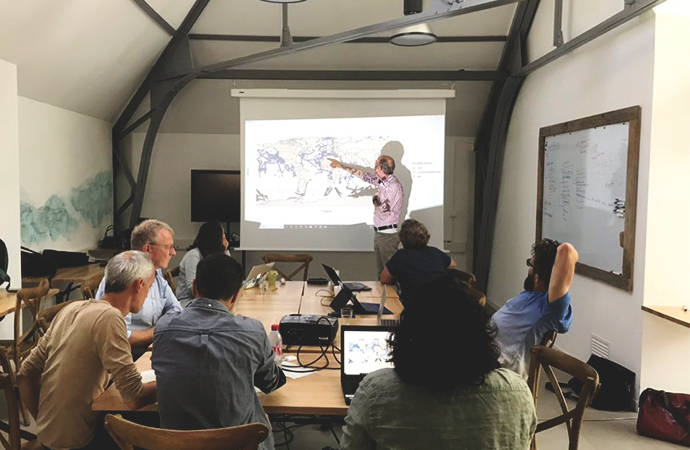Extend research work
 Meeting of the group FORCIS in 2020
Meeting of the group FORCIS in 2020 The main objective of CESAB is to implement innovative work of synthesis and analysis of existing data sets in the field of biodiversity. Each year, the center welcomes a large number of researchers from all continents, during several working sessions.
Each group selected following a rigorous procedure is funded for two to three years, depending on the format of the call, and benefits from the support of a dedicated postdoctoral fellow and the CESAB team: technical, administrative, logistical and communication support.
Thanks to the network and collaboration developed at CESAB, the participants of a CESAB group can give a second life to their project. Through the CESABAFTER meetings, the FRB makes the CESAB’s team and the center in Montpellier available to groups who wish to extend their work or open up on new perspectives. CESABATER meetings are an opportunity to engage in novel scientific collaborations to extend the initial project. In particular, theses meetings will build upon the work from previous years to initiate new collective publications and answer to new calls for proposals. Cost of these CESABATER meetings can be partially covered by CESAB.
FUNCTIONALWEBS: The functional diversity of food webs: linking ecology, physiology and biogeography
PI: Régis CEREGHINO – Université Paul Sabatier Toulouse III (France)
FREE : Causes and consequences of functional rarity from local to global scales
PI: Cyrille VIOLLE– CEFE-CNRS (France)
Funding: EDF
GEISHA: Global Evaluation of the Impacts of Storms on freshwater Habitat and structure of phytoplankton Assemblages
PIs: Orlane ANNEVILLE – INRAe (France), Jason STOCKWELL – University of Vermont (USA) and Vijay PATIL – US Geological Survey, Alaska (USA)
Funding: INRAe, Ambassade de France au Canada
AFROBIODRIVERS: African biodiversity dynamics: interactions between ecological processes and conservation actions
PI: Hervé FRITZ – CNRS, UCB Lyon (France)
Funding: CNRS
RAATD: Retrospective analysis of vertebrates’ tracking data in Antarctica to identify ecologically significant areas
PIs : Yan ROPERT-COUDERT – CEBC, CNRS (France) and Mark HINDELL – University of Tasmania (Australia)
Funding: CNRS.
The group continues to develop projects using the dataset published in Scientific data and this meeting was an effective way to keep the group together and to discuss the development of new projects. The group plans to continue to accumulate data, especially for species that were not included in the original project. RAATD hopes to replicate the CESAB model and hold regular meetings to continue this research work.
ACTIAS: Global patterns of insect diversity, distribution and evolutionary distinctness – What can we learn from two of the best-documented families of moths?
PI: Rodolphe ROUGERIE – MNHN (France)
Funding: National Museum of Natural History (MNHN)
During this meeting, the group was able to identify future needs and priorities for data collection and prepare a comprehensive meta-analysis of two butterfly families – the Saturniidae and the Sphingidae – with complete species coverage and combining phylogeny, distribution and trait analysis.
PELAGIC: Prioritizing ecologically significant and globally important marine conservation areas for vertebrates: synthesizing the best available knowledge to inform management and policy
PI: David MOUILLOT – University of Montpellier (France)
Funding: Fondation bertarelli, Zoological Society of London, University of Montpellier
At the end of this meeting, a conference was organized on the challenges and opportunities in large-scale conservation on the 29th of November 2019. During this symposium a group of international researchers presented the new challenges associated with monitoring both wildlife and human activities in protected areas using up to date technologies.